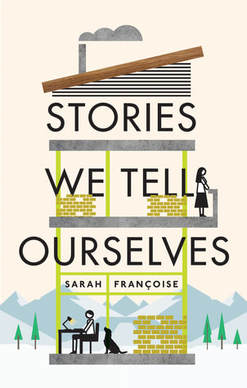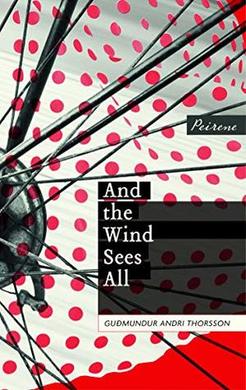Stories We Tell Ourselves by Sarah Françoise
Beginning Sarah Françoise’s debut novel on the day I posted The Annethology Christmas message, I thought it would be the perfect antidote to the imposed festivities. But of course Christmas scenes in novels aren’t really about the turkey and tinsel, but the relationship tensions when people congregate around a shared task that everyone interprets in a different way. While baubled with humorous touches, I found this particular family’s pantomime of misunderstandings and gentle resentments particularly poignant, especially the predicament of the parents, Frank and Joan.
I particularly liked this, so telling of family life, from the perspective of the oldest – in years, if not in wisdom – child (p82-83):
Last year, everyone had received a copy of her chapbook: Yelp Travel Plaza Review Poems, published by Incomprehensible Womb press. Her parents had been supportive in their own ways, that is to say, in ways that were diametrically opposed. Joan had said, ‘You’re so clever,’ and Frank had typed out a line-by-line critique of her work. Wim ordered copies at every bookstore in London, giving a fake name and phone number each time. Maya never said a thing. When she visited her sister in the spring, Lois found the chapbook in Gitsy’s room, covered in doodles and Frozen stickers.
The novel’s narrated in the close third-person, giving the reader the opportunity to empathise with each of the family members in turn – as well as, surprisingly effectively, Simon the dog. The language sparkles although, at the beginning, I found it much stronger than the story, like a beautiful stained-glass window that conceals the view.
A few family members seem to have been engaged in therapy, although we only see it close up from Lois’s point of view, after she’s confessed to an affair (p83-84):
‘She tells me she stopped all communication when she wants a medal,’ Nick told the marriage counsellor they had started seeing, back in the spring.
‘It’s common for spouses or partners to try to negate the attachment left over from the affair,’ said the counsellor. ‘There is usually a phase of abnegation.’
Lois kept her mouth mostly shut during those first sessions, for fear that more unnecessary truths would come dribbling out. The sessions provided an audience for her guilt and a witness to Nick’s magnanimity. They never quite got to the part where the cheating party considers why they’d had an affair in the first place. In fact, they stopped going to counselling the moment they regained a certain equality in their sessions – an equality Lois thought Nick was not ready to concede.
Stories We Tell Ourselves is published by Head of Zeus who provided my review copy.
And the Wind Sees All by Guðmundur Andri Thorsson translated by Bjørg Arnadottir and Andrew Cauthery
Well-intentioned but somewhat naive parents send their precious child out into the world, to some activity that might be challenging, but ultimately of benefit to the child. Unfortunately, the child learns not resilience, but the ability to keep quiet about their own inconvenient concerns. Which wouldn’t be too damaging if the world they’d entered were sufficiently benign. But if they’re sent to dwell among people who don’t respect a child’s mind and body, they might live with the pain for the rest of their lives.
Although familiar with this story, I was shocked to encounter it almost halfway through a novella described as “capturing the serene spirit of an Icelandic fishing village” when Svenni, an upstanding member of the community calls in sick. On his second bottle of vodka, he phones his sister and tells her about the summer he was eleven and sent from Reykjavik to live and work on his aunt and uncle’s farm.
Being already a little sleepy when I picked up the book, I’d been lulled by the lyricism of the journey in and out of the heads of various villagers whom Kata, the choir conductor preparing for a concert, cycles past on her way to the village hall. Svenni’s chapter shocked me out of my stupor, and was all the more powerful for the calm that came before. Soon I was reading about loneliness, corruption, and economic and psychological collapse.
And yet, consistent with my reading experience, and the publisher’s bizarre positioning of it as a cosy narrative, as if they haven’t actually read it, it’s also about the attraction of not knowing, as exemplified in these two quotes: the first (p93) when some friends have been chatting about a woman’s disturbing dream about a dead child; the second (p123) looking back to the financial crash:
They all look thoughtful, nod gravely and quickly have another drink in case they should think of something that might deepen this discussion even further.
This was during the years in which all who wanted to believe were allowed to believe what they wanted and all who wanted to lie could lie as much as they pleased. There was only one condition: unqualified success.
The publishers – Peirene who provided my review copy – suggest we read this as Nordic hygge but, I can’t believe that was the author’s original intent. To me, it’s Icelandic Jon McGregor revealing the darkness beneath the deceptively calm surface of village life. Far from disappointed not to find the promised “gentle journey” between its covers, And the Wind Sees All is one of my favourite reads of the year.
It’s interesting that I read this so soon after Land of the Living by Georgina Harding, another recent favourite which also asks How do we live authentically in a world that is both beautiful and intensely cruel? How do we return to the ordinary when we’ve been taken closer to the edge than most?
For another novel about darkness beneath the surface, follow this link:
























 RSS Feed
RSS Feed





















